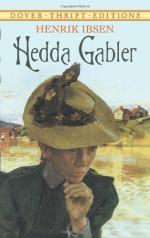
|
"Hedda Gabler" is the maiden name of the character we meet in the play as "Hedda Tesman". However, we often hear her referred to by other characters as "Hedda Gabler" and the play itself is named HEDDA GABLER. Part 1: What do you think was Ibsen's purpose in this? Is he making her connection to her father, or her unmarried life, stronger than her connection to her husband? We see many contrasts between Hedda's maiden life and her married life, are there any parallel changes in her, or, like her name, is she stuck how she was before getting married? Part 2: Throughout the play we hear people refer to "Hedda Gabler" with deference and admiration. Hedda was clearly successful at what was expected of her before marriage. What happened? Why is she having such a hard time now? Does Hedda have a way to continue her own legacy, or in the play is she merely the shadow of herself? Part 3: What role has society played in causing this discrepancy in Hedda's life? Does she have many choices that would lead her to happiness or self fulfillment?
|
This section contains 5,340 words (approx. 18 pages at 300 words per page) |

|




